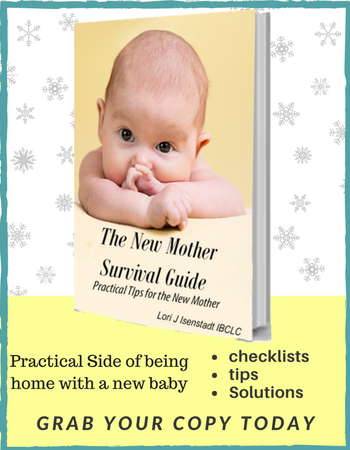Episode 369
This week, a mom posted this question:
My son is 5 days old. Since day one we have struggled with getting him to sleep anywhere but in our arms. When we put him down to sleep he will maybe be quiet for a couple minutes but will start crying. He will not calm until we pick him back up. We have the hall bassinet in our bedroom and a crib in a separate room. We have tried both as well as a baby box with the same outcome. We have used various swaddles, sleep sacks, arms in arms out. Every night one of us is awake with him every moment of the night and we are getting overwhelmed and feel defeated and hopeless. I get scared though because there will be times I’m sitting up with him or nursing at night and I will start to fall asleep. I don’t know what to do and am hoping for advice/experience that may help the situation.
Now, I am happy to say that she did get a lot of good advice and one of my favorite piece of advice was to suggest that she practice co-sleeping and other members agreed and brought up the importance of safe co-sleeping. Once you are in the group, you can check out the whole thread. For right now, I want to say that in addition to co-sleeping as a response to her babies frequent waking, I also want to be sure her baby is getting enough food. In my experience, a baby who is waking up this frequently is usually a baby that is not getting enough food per feeding. Some babies may actually be getting enough over the course of the whole day, but they are taking half as much food as they really need each feeding and are having twice as many feedings to get the total volume needed per day. They may not be getting enough for them to feel fully satiated at each feeding. This causes them to snack throughout the day and night.
In my experience, when this happens, babies usually do not gain so well as they are burning a lot of calories from the excessive feedings to try and get enough food. They are also not sleeping too well and are often spending a lot of time crying. All these issues together, frequently burn more calories than they are taking in, which is what leads to poor weight gain.
I would like to work directly with this mom and teach her about safe co-sleeping. I would also like to make sure that she understands the importance of ruling out any medical issues for her baby’s behavior. I want to remind you that yes, newborns do wake up frequently and do feed frequently and do like to to be held and in close touching proximity to their mom most of the time. But, this member said:
Every night one of us is awake with him every moment of the night and we are getting overwhelmed and feel defeated and hopeless. I get scared though because there will be times I’m sitting up with him or nursing at night and I will start to fall asleep. I don’t know what to do and am hoping for advice/experience that may help the situation.
So, in addition to the wonderful support and advice she was given by out other group members, Here is what else I would like for her to factor in as she works towards solving this situation.
Many of you have heard me say that when we are trying to figure out if your baby is getting enough at the breast, that my primary concern is not how long your baby is at the breast as this is not the best way to judge how breastfeeding is going. It seems this is a popular piece of advise moms are being given. If your baby spends about “x” amount of minutes at your breast, then your baby is doing a good job. If you are new to the show, you will want to go back to Episode #247. I share with you my words of wisdom as I explain why time spent at the breast is not nearly as important as focusing on good latch is to good breastfeeding.
You have hear me talk a lot about why you wanted to avoid getting too hooked into how long your baby was at the breast and that your focus should be more about how well your baby is latched on. My mantra for this weeks show is: Watch the Baby, not the clock.
The very first thing you need to know is how to tell when your baby is transferring milk at the breast, meaning do you know how to tell when your baby is actively drinking versus when your baby is at your breast and more or less taking sucks here and there and just hanging out, spending more time sleeping or pacifying at the breast, rather than actually drinking a good feedings worth. It is imperative that you learn how to tell if your baby is getting enough.
When I work with moms, I sometimes find that there whole host of breastfeeding challenges, is all solved by just changing what is happening during feeding times. Once they shift from a baby snacking around the clock, to a baby getting a full belly each and every feeding, all of a sudden there baby does fall asleep after some breastfeedings and does sleep for an hour and a half or more. Once they shift from a baby snacking around the clock, to a baby getting a full belly each and every feeding, all of a sudden there baby actually does okay with being put down for short periods of time, or calm down and sleep easily when laying in close proximity to their mom as she naps too.
Sure babies get fussy and gassy and overwhelmed and are not the sleeping baby you thought you were going to get, however, you would be very surprised to see the difference between a snacker and a well fed baby. While breastfeeding is a natural thing to do, it does not necessarily come naturally to most of us. There is a huge learning curve, particular in the early days of breastfeeding. I am going to now share some information that might be helpful for you to know as you are working hard to ensure your baby has good, satiated feedings that fill his belly.
I would love for you to factor this information in with all of the other advise you have been receiving.
Let’s begin by understanding that while we can have our averages… average supply that moms have, the average time it takes a baby to get a good feeding, average weight gain, average feeding frequency, there are also variables in all these areas.
Each woman has a different breast storage capacity. You know I like to enjoy life and have a good sense of humor about all things breastfeeding. Well, my favorite thing to say is that all moms are “holding” a different amount of milk in their breasts. This differs from feeding to feeding and even differs from the right breast to the left breast. Yes, it’s true. I know a lot of moms go into their breastfeeding experience assuming that their right and left breast will make the same amount….. this is so not true for many of us.
We have different volumes of milk that we hold in each breast. Guess what else is different. Your baby. Two adults live in the same household and are served the same amount of food. It is lik ely that one is going to be a slower eater than the other. It is likely one will take 15 minutes to finish their meal and the other will take 25 minutes. If you are like most people, there will be some feedings during the day that you are hungrier and will eat more than at other times of the day.
Me? Well, I am not so hungry in the earlier part of the day and have to make myself eat breakfast. Near the end of the day is when I seem to be the hungriest. If I am eating more food, it will also take me longer to finish my meal.
Think about this for a minute – If each of your breasts make a different amount and your baby does not have the exact feeding behavior as your friends baby who lives across the street, doesn’t it stand to reason that each baby will take a different amount of time to feed, until they are full. Why on earth do we expect each baby to finish a feeding in exactly the same amount of time?
We know that when the milk is removed frequently and efficiently, moms tend to build a very good supply. We know that when the baby gets free range of time at the breast, the baby tends to control the volume of milk a mom makes.
Now let’s think about the mom who times her baby at the breast. If her baby is still feeding effectively, is alert and interested and sucking and swallowing and the mom removes her baby at the breast after 10 minutes, she is likely stopping her baby from having a full feeding.
It is like someone is taking away your plate of food just because you have been at it for 10 minutes. Sorry you… it doesn’t matter if you were eating a slower pace, it doesn’t matter if you want more… sorry, tough luck. that’s all you get to eat.
If you are watching the clock and this is your focus, can you see how it will be difficult for you to build a supply to meet your babies needs. Can you see how it will be hard for your baby to get a full belly each feeding. Can you see how your baby will not gain weight appropriately. You are letting the clock dictate how much your baby gets.
Big Problem: Your baby cannot tell time. Does not know he needs to hurry up and eat. And even if he does know that he needs to hurry he can only eat so fast. if someone told you to rush to eat your meal, you might be able to eat a little faster, but honestly how much faster can you chew and swallow?
Ask yourself? How happy will you be if someone timed your feeding and took away your food at a specified time? I have a feeling you will be pretty angry. Very frustrated. probably kick and scream.
Babies whose food is taken away from them if they do not have a full belly. Well, they will be pretty upset. Lots of new parents that I work with, mistake this for colic or fussy or gassy or perhaps they need a diaper change. Pacifiers are often given in this case because parents don’t know what else to do to stop their baby from crying?
Parents who are timing their babies – I have asked? have you tried offering the breast again? No, they don’t. Because when you are new at this and have been told and are trained to only give the feeding 10 minutes worth – you don’t want to teach your child to use you as a pacifier? You don’t want to overfeed your baby. These are all the things you have been told and you are trying your best to follow the rules and be a good parent.
Well, I am here to tell you that these rules are wrong. They are stupid..and as I said in the beginning of the show they are harmful. Why? Because frequently this kind of behavior, watching the clock – limits your babies intake and limits your bodies ability to make enough for your baby. And all because you were timing your baby at the breast.
What are you supposed to do, if you are not watching the clock? Well, watch your baby, of course! I would love for you to spend time trying to figure out what your babies behavior is trying to tell you. Pay close attention and you will get better at recognizing the signs that your baby is hungry, you will begin recognizing when they are getting close to being finished with a side at the breast. Give yourself a little time to watch over your baby and you will get pretty good at figuring out of they have had enough food. Instead of taking the baby off when the clock or your app tells you they have been feeding for 10 minutes, try not taking your baby off, when your baby has slowed down to hardly any sucking activity or falls asleep at the breast. These are common signs that your baby is done. Avoid taking them off in the middle of the feeding, just because the clock tells you its time. Remember how you would feel if someone whips away your plate of food just because they think you have been at it long enough.
I would like to come full circle with this combination to say: It is not so much as how long your baby is at the breast. It is not so much as to how many feedings they are having and if they are taking both sides or not – It is about you learning how to tell when they are being efficient at the breast and getting a good meal each time. Once you are assured they are getting enough per feeding and you are still suffering with this excessive feedings and wakeful times, you will definitely want to seek the help of an IBCLC who can sit with just you and your baby and provide a full evaluation.
Your Online Breastfeeding Class
Learn how to breastfeed – Be comfortable. Be confident.
The learning continues well beyond the average breastfeeding basics class that is 60-90 minutes. In this class, we have over 15 hours of audio lessons, combined with many hours of videos to help support what you are learning. We cover breastfeeding and medication safety, what to do if your baby does not latch on, common breastfeeding challenges, tongue tie, premature babies, building a good supply, returning to work and pumping. Take a look at the list below and follow the link to the class page so you can see more specifics of what is covered. I want to ensure that we got you covered and that you have great support well beyond the newborn days.
- Using your pregnancy time to prepare for breastfeeding
- Tips on how to prepare your home for a newborn
- Specific details about the first 24 hours after birth.
- Exactly what to expect the first two weeks after birth
- What can you do if your baby is not latching on
- Common and not so common breastfeeding challenges
- What you can expect over the next few months
- Returning to work as a breastfeeding/pumping mom
- Pumping and storing your milk
- When to begin pumping and building your freezer stash
- How to make a smooth transition to postpartum life
- Lessons dedicated to partners and breastfeeding knowledge.
- Breastfeeding and the 1 year old
- Breastfeeding the toddler and beyond
- Tandem nursing
- Breastfeeding through a pregnancy
- Medication and mother’s milk
- Weaning
Once you register for the class, you have immediate access to:
- Audio Lessons
- Videos
- Educational handouts
- Helpful checklists
- Our “members only” group
- Weekly group LIVE Q&A sessions
Gain confidence in breastfeeding.
Expert advice from Lori J. Isenstadt, IBCLC who has over 25 years of experience in maternal health and lactation. I will help you navigate the ins and outs of breastfeeding.
Listen anywhere and anytime. Imagine not having to sit in a classroom or stare at a screen. You can learn all about breastfeeding while going for a walk, driving to work or running errands, traveling on a plane, train or bus. Because you can download the audios, learning is easy and convenient. Get ready to learn anytime whenever it’s convenient for you and your partner. You can be cooking dinner together and listening to the class. Perhaps relaxing together in the evening in your comfy clothes. You can learn together. Easy access to all class materials. Your class never expires. You’ll be able to listen and download the materials at your convenience.
You are not alone!
Once you are a student in the breastfeeding class, you have regular access to ongoing support for the whole time you are breastfeeding. You can have your questions answered by Lori J. Isenstadt, IBCLC, in our private group as well as our weekly live Q & A sessions. Just check out the Bonuses below to see how I provide you with ongoing support..
Exclusive Bonus #1
Immediate access to a private group for class students only. I will be answering your questions 5 days a week.
Exclusive Bonus #2
Invitation to join our weekly Q & A session with Lori and other students.
Exclusive Bonus #3
Need additional help? *25% discount off a private consult – for students only.
*If you are in the Phoenix metro area. use this link to schedule your Office or Home lactation consult.
*If you are out of the area, use this link to schedule a Skype call
Do you have a question about the class before you purchase? Send it to – aabreastfeeding@hotmail.com
 Register for the Breastfeeding class
Register for the Breastfeeding class
http://www.aabreastfeeding.com/audioclass
Additional ways to connect with me:
Like us on Facebook HERE:
http://bit.ly/2dNPlsC
Follow us on Twitter HERE:
@breastfeedingaz
http://bit.ly/2BfEIJ2
Follow us on Pinterest HERE:
https://www.pinterest.com/lorijisenstadt
Subscribe on iTunes the All About Breastfeeding show HERE:
https://apple.co/2FJGwsV
Lori J. Isenstadt, IBCLC
 Lori Jill Isenstadt, IBCLC is a huge breastfeeding supporter. She has spent much of her adult life working in the maternal health field. Once she became turned on to birth and became a childbirth educator, there was no stopping her love of working with families during their childbearing years. Lori became a Birth doula and a Postpartum doula and soon became a lactation consultant. She has been helping moms and babies with breastfeeding for over 25 years. Lori founded her private practice, All About Breastfeeding where she meets with moms one on one to help solve their breastfeeding challenges. She is an international speaker, book author and the host of the popular itunes podcast, All About Breastfeeding, the place where the girls hang out. You can reach Lori by email at: [email protected] or contact her via her website: allaboutbreastfeeding.biz/contact
Lori Jill Isenstadt, IBCLC is a huge breastfeeding supporter. She has spent much of her adult life working in the maternal health field. Once she became turned on to birth and became a childbirth educator, there was no stopping her love of working with families during their childbearing years. Lori became a Birth doula and a Postpartum doula and soon became a lactation consultant. She has been helping moms and babies with breastfeeding for over 25 years. Lori founded her private practice, All About Breastfeeding where she meets with moms one on one to help solve their breastfeeding challenges. She is an international speaker, book author and the host of the popular itunes podcast, All About Breastfeeding, the place where the girls hang out. You can reach Lori by email at: [email protected] or contact her via her website: allaboutbreastfeeding.biz/contact

Submit a comment
your email address will not be published








